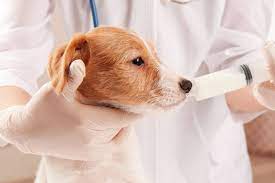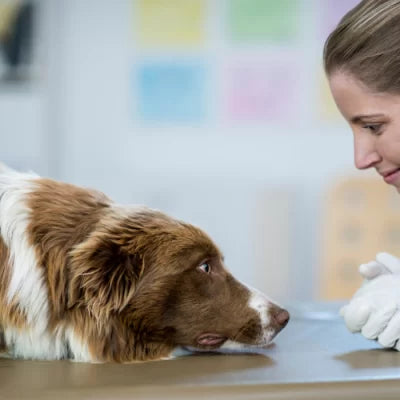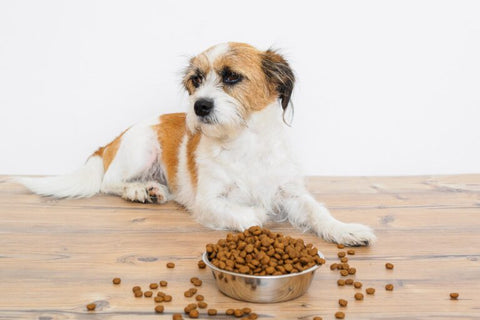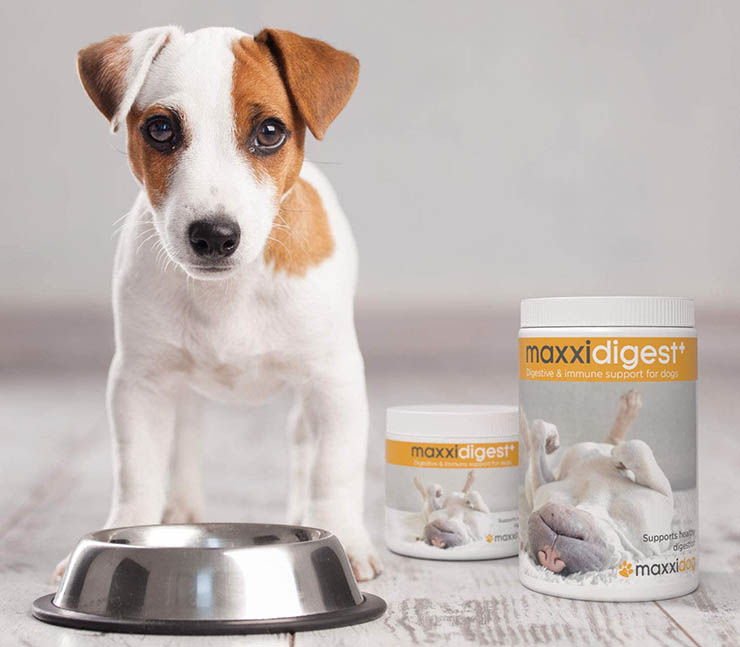
Have you ever wondered whether you should add a daily probiotic supplement to your dog's routine? These supplements have gained popularity – both for human health and canine well-being – and for good reason. Let's investigate!
Your dog's intestine...
In your dog's digestive tract is a bustling world of bacteria and microorganisms, collectively known as the microbiome.
Think of it as a vibrant community where good and bad bacteria coexist.
Let's focus on the good bacteria, also known as probiotics . They are the superheroes of this microbial world and, when in proper balance, contribute significantly to your dog's overall health and well-being.
Probiotics play a role in supporting digestion, immunity, and more.

The benefits of probiotics for dogs
Digestive health
- Probiotics promote a diverse and balanced community of beneficial bacteria in the gut and help eliminate “bad” bacteria.
- They can improve the breakdown of food in the digestive tract, aiding nutrient absorption.
- Probiotics help regulate the fermentation process in the intestine, potentially reducing excessive gas production. In other words, less dabs!
- A well-balanced microbiome can contribute to firmer, well-formed stools.
- Probiotics can help regulate bowel movements, potentially reducing the occurrence of diarrhea and relieving constipation in dogs.
Immune system
- About 70-80% of your dog's immune system resides in the intestine. For this reason , bacteria in the intestine are naturally essential to your dog's health.
- Probiotics help regulate the immune response, potentially reducing the risk of infections and supporting overall immune health.
According to At Cornell University College of Veterinary Medicine , conditions that may benefit from probiotic treatment include:
- Allergies
- Anxiety
- Bad breath
- Coat quality
- Diarrhea
- Immune disorders
- Intestinal inflammation
- Irritable bowel syndrome
- Liver disease
- Obesity
- skin disease
- Urinary tract infections
They may also benefit yeast overgrowth and leaky gut syndrome.

Safe “human” food for dogs, rich in probiotics
Probiotics are found naturally in many foods.
Some dog-safe options include:
-
Yogurt: Opt for natural, unsweetened yogurt with live cultures. Add a spoonful to your dog's food bowl or spread it out on a mat for him to lick. You can also use it as a base for frozen treats!
-
Goat's milk: There are brands that produce goat's milk for dogs and, among the many benefits, this milk is a good source of probiotics. Use it to moisten your pup's food, add it to homemade treats or let him lick it straight from the bowl!
-
Kefir: This fermented milk drink is rich in probiotics and can be a tasty addition to your dog's diet. Be sure to choose varieties with no added sugars.
-
Bone Broth: When prepared correctly, bone broth can be a good source of probiotics that support your dog's intestinal health. Just like the other foods on this list, you can use it to moisten your dog's meals or in frozen treats!
-
Apple vinegar: When used in moderation and diluted appropriately, apple cider vinegar can be added to your dog's water or food to introduce probiotics. Talk to your veterinarian before adding ACV to your dog's diet .
-
Fermented Foods: According to Dogs Naturally, foods like sauerkraut, kombucha and kimchi can be a healthy part of your dog's diet. Note: When purchasing store-bought fermented foods for your dog, make sure the ingredient label does not include any additives that are toxic to dogs . Additionally, Dogs Naturally states: “Fermented foods can also be a problem for dogs with SIBO (small intestinal bacterial overgrowth) and yeast infections, so use in moderation and caution.” Talk to your veterinarian before adding fermented foods to your dog's diet.

Ideas for finding a high-quality probiotic supplement
In addition to finding probiotics in various food sources, there are also probiotic supplements designed for dogs.
When choosing a probiotic supplement for your dog , consider the following factors:
-
Strain diversity: Look for a supplement that contains a variety of probiotic strains to provide comprehensive support for your dog's gut microbiome.
-
UFC Count: Probiotics are measured in colony forming units, or CFU. A higher CFU count indicates a more potent and effective probiotic supplement.
-
Prebiotic: Probiotics are live bacteria. Like any living entity, they need to eat. That's where prebiotics come into play. Prebiotics are soluble, indigestible fibers that feed probiotics. Without them, probiotics will be less effective and will eventually die. This is why it is important to find a probiotic supplement that contains a prebiotic source. Prebiotics are found in foods like bananas, apples, pumpkins, asparagus and more.
-
Added Ingredients: Check ingredient labels to ensure supplements aren't full of inactive, non-essential ingredients like sugars and starches. Furthermore, a quality probiotic should not contain artificial colors, flavors and preservatives.
-
Brand reputation: Choose supplements from reputable brands with a history of producing high-quality pet products.
In our online store you will find several probiotics , all from quality brands that can help your Bigeye lead a healthier life.





Leave a comment